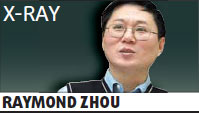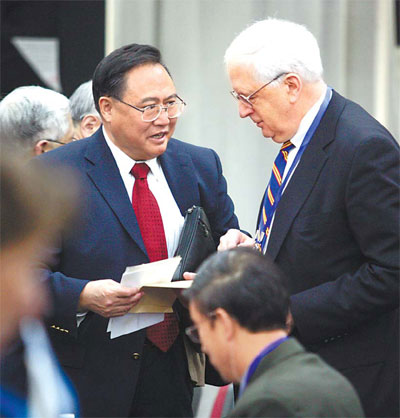 When a book comes out in more than one language, it is not difficult to tell which version is more important: The one the author writes in is usually considered "the official version".
When a book comes out in more than one language, it is not difficult to tell which version is more important: The one the author writes in is usually considered "the official version".
Maybe so. But in the case of Xiong Guangkai, the English edition could well be more valuable - even though the Chinese one is definitely more "official".
That is because of Xiong's unique stature. He is chairman of the China Institute for International Strategic Studies and holds the military title of "general". But he is also a guest professor with several prestigious schools of higher learning, including Tsinghua, Peking University, Shanghai Jiaotong, PLA National Defense University and PLA University of International Studies.
 |
|
Xiong Guangkai with J. Stapleton Roy, former US ambassador to China, at an international forum, China's Peaceful Development and Harmonious World, in Beijing in November, 2007. [China Daily by Wu Zhiyi] |
Before he retired from his military post as deputy chief of the PLA General Staff, he was a senior consultant to national policy-making, which took him to the inner circle of the real action. He understands how China's leaders interpret world events and how national security policies are formulated.
Yet, the ultimate insider exhibits the kind of objectivity associated with a scholar as he can look at things from the perspective of an observer and analyst. And he knows how to explain to outsiders in a language they can understand. That gives him all the insights but none of the prejudices, which add to the gravitas of the writing. And that is why the English version of International Situation and Security Strategy may have a special appeal to those China watchers who specialize in reading tea-leaves.
For the past decade, General Xiong has been publishing a year-end assessment of the "international strategic situation" at the end or beginning of every year. Besides, he is an active speaker around the country - and the world - and expounds China's stand on national and military issues. Many of these articles and speeches have found their way into this collection. What is truly amazing is that none of them needed "updating" during the editing process because, as General Xiong says, he did not write for specific occasions and therefore his writings have stood the test of time.
He is proud he took a "comprehensive and long-term view" of the international strategic situation back at the dawn of the new century. He believed that peace and development would remain the two major themes of the century, and China would face more opportunities than challenges. "Multi-polarity" would hit bumps but still be the trend, he argued. Economic globalization would have its quirks, but was "unavoidable", he noted. He also emphasized the function of technology and "the revolution in military affairs".
